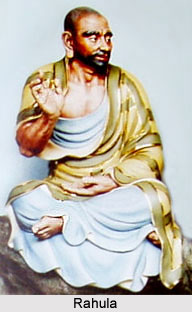 Hindu name Rahula means fetter or binding. Rahula was the only son of Gautama Buddha and his wife, Yashodhara. The very day when Buddha left his palace to walk on the path of asceticism Rahula was born. According to legends when the news of his son`s birth was conveyed to him he said "R?hu j?to, bandhanam j?tam" meaning a fetter has been born. While Prince Siddhartha (Buddha) was contemplating to renounce the material world he considered his son a tie that would keep him bound to Yashodhara and the world. However the birth of his son spurred his desire of renunciation and he left the golden cage (material world).
Hindu name Rahula means fetter or binding. Rahula was the only son of Gautama Buddha and his wife, Yashodhara. The very day when Buddha left his palace to walk on the path of asceticism Rahula was born. According to legends when the news of his son`s birth was conveyed to him he said "R?hu j?to, bandhanam j?tam" meaning a fetter has been born. While Prince Siddhartha (Buddha) was contemplating to renounce the material world he considered his son a tie that would keep him bound to Yashodhara and the world. However the birth of his son spurred his desire of renunciation and he left the golden cage (material world).
Rahula was brought up in the palace by his mother and King Suddhodana, grandfather. When the boy was 7 years old Buddha visited Kapilavastu. Yashodhara took young Rahula to listen to his sermon. There she asked Rahula to ask Buddha for his inheritance. Rahula followed Buddha saying, "Give me my inheritance, O Monk." The child followed Buddha to the Park of Nigrodha as nobody stopped him. On the child`s persistence Buddha thought, "He desires his father`s inheritance, but it is wrought with troubles. I shall give him the benefit of my spiritual Enlightenment and make him an owner of a transcendental inheritance." This was the only thing that he could have bestowed upon his son.
Buddha deputed Sariputta to ordain little Rahula. However Yashodhara and King Suddhodhana complained that Buddha took away Rahula without their permission. It was after this incident that Buddha made parental consent necessary for all those who desired to be ordained.
It is said that the child was one of the most eager disciples of Buddha. The Enlightened One too took great interest in his education. It was probably because of the fact that Rahula was without his father from his childhood that Buddha eagerly looked after his tutelage. Sariputta was made his preceptor and Moggallani became his teacher. As the legends go the child would wake up every morning, take a handful of sand grains and say, "May I have today, as many words of counsel from my teacher as there are here grains of sand."
Later Rahula became one of the arahants who followed Buddhism. The son of the Enlightened One passed away before him.




















